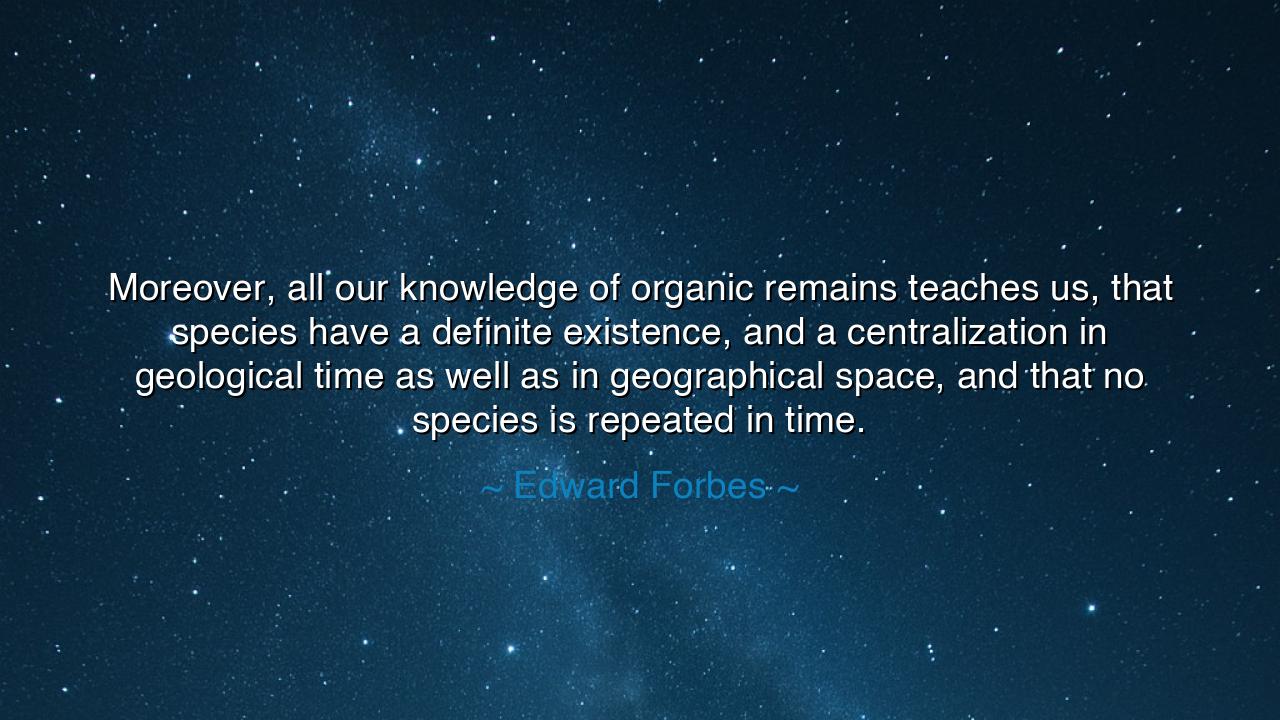
Moreover, all our knowledge of organic remains teaches us, that
Moreover, all our knowledge of organic remains teaches us, that species have a definite existence, and a centralization in geological time as well as in geographical space, and that no species is repeated in time.






When Edward Forbes, the 19th-century naturalist and pioneer of marine biology, declared, “Moreover, all our knowledge of organic remains teaches us, that species have a definite existence, and a centralization in geological time as well as in geographical space, and that no species is repeated in time,” he spoke with the awe of one who had glimpsed the grand order of nature. His words rise like a hymn to the law of life and death, to the rhythm by which creation itself unfolds. In them, we hear not the cold precision of science, but the deep reverence of a thinker who saw in the earth’s fossils a sacred scripture — one written in bone and stone, where every species is a verse in the great poem of existence.
The origin of this quote lies in Forbes’s study of paleontology and natural history, fields that, in his time, were illuminating truths long buried beneath the earth. Through the careful examination of organic remains — the fossils of creatures that had lived and perished across ages — Forbes discerned a profound pattern: that every species, like a human life, has a beginning, a flourishing, and an end. He saw that each species holds a definite existence, confined to a particular moment in geological time and a particular place in the world. No creature, once gone, returns again; its melody is sung once and forever, then passed on to others in the symphony of evolution.
In this recognition, Forbes articulated a vision that bridged science and philosophy. He perceived that creation is not random chaos but a grand sequence — a sacred procession through time, where each living form fulfills its appointed purpose before yielding to the next. His phrase, “no species is repeated in time,” carries a truth that transcends biology: that life itself is unrepeatable. Each being, each generation, each civilization arises, fulfills its role, and passes away, leaving traces for those who follow to study and revere. In this way, Forbes teaches that all of nature — even in its death — is an act of continuity. Nothing is wasted; nothing is in vain.
This idea finds echoes throughout the chronicles of life. Consider the trilobites, ancient creatures that once ruled the seas for hundreds of millions of years. They were countless in number and magnificent in diversity, yet, when their age was done, they vanished utterly — never to return. Their time passed, and in their place came new forms, each adapted to a new world. The dinosaurs too had their dominion, vast and glorious, yet even their reign ended in fire and ash, paving the way for mammals, for humanity, and for us. Through these cycles of emergence and extinction, the earth reveals the truth Forbes saw so clearly: that creation moves forward in stages, never repeating, ever evolving.
Yet Forbes’s insight holds more than scientific meaning — it carries moral and spiritual weight. His reflection on the definiteness of existence reminds us of the sacred brevity of our own time. Just as no species is repeated, no life, no moment, no chance of goodness ever returns once it is gone. The fossilized bones of ancient beings are not merely remnants of what was; they are reminders to the living — that all things pass, and that the worth of existence lies not in its duration, but in the purpose fulfilled while it endures. To understand this is to live with reverence: to act wisely, knowing that our days, like the ages of species, are numbered.
From this understanding, we may draw a lesson as timeless as the rocks themselves: that every being, every generation, must live its season with integrity and imagination. Just as each species has its central moment in the great span of time, so too does each human soul have its appointed hour — its work to do, its gifts to give. To waste this hour through complacency or fear is to betray the order of life. To fulfill it, even humbly, is to join the grand continuity that links trilobite to bird, and fossil to philosopher. In Forbes’s vision, the nobility of existence lies not in eternal life, but in the beauty of transience — in the courage to bloom brightly for one’s age and then yield to the next.
Thus, let Edward Forbes’s words stand as both a scientific truth and a spiritual meditation: that life, in all its forms, is singular and sacred. No species is repeated in time, just as no soul is repeated in the world. We are each entrusted with a moment — brief but luminous — in the vast continuum of creation. Let us live it with purpose. Let us honor the time given to us, and the time that came before us, and the time that will follow after. For to recognize that all existence is finite is not to despair — it is to awaken to the wonder of being alive in this fleeting, irreplaceable instant of eternity.






AAdministratorAdministrator
Welcome, honored guests. Please leave a comment, we will respond soon